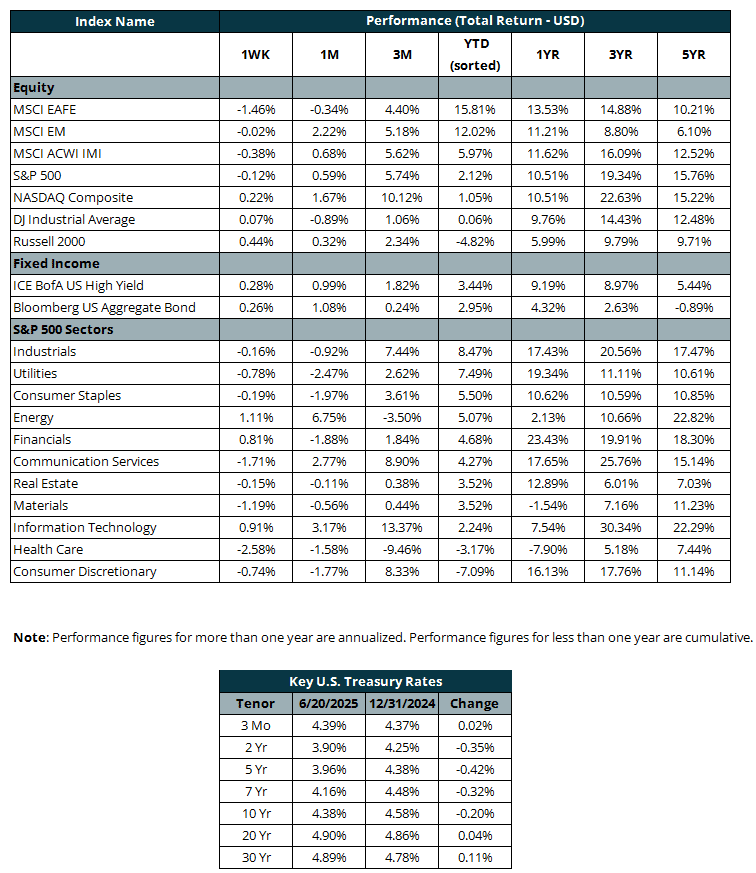Markets on Edge as US Enters Iran/Israel Conflict

by Sequoia Financial Group

by Sequoia Financial Group
The holiday-shortened week ended with benchmark indices back nearly right where they started. The S&P 500 lost 0.12%, the NASDAQ gained 0.22%, and the Bloomberg Aggregate Bond Index gained 0.26%, despite potential market-moving headlines from the Federal Reserve, President Trump, and the US Senate.
The week started optimistically enough. Iran signaled it wanted to end hostilities with Israel, and also claimed to be open to restarting negotiations with the US over its nuclear program. The news understandably weighed on defense stocks and the price of oil, but the overall market cheered the developments. In fact, a number of the highest-profile stocks, including Microsoft, IBM, and Phillip Morris, traded at all-time highs.
Sadly, the excitement was short-lived, as the fighting between Iran and Israel continued. President Trump called for the evacuation of Tehran, while the Pentagon moved aircraft and warships to the Middle East to provide optionality and to bolster Israel’s defenses. Disappointing retail sales data also weighed on stock prices. Consumer spending dipped 0.9% in May, worse than the expected decline of 0.6%.
The spending slowdown had little impact on the Federal Reserve’s decision to hold the Fed funds rate steady for the fourth meeting in a row. The Fed’s press release said “. . . recent indicators suggest that economic activity has continued to expand at a solid pace. The unemployment rate remains low, and labor market conditions remain solid. Inflation remains somewhat elevated.” Fed Governor Christopher Waller told CNBC the Fed could cut rates as early as July, but the financial markets still expect the Fed to hold rates level in July before cutting rates in September. That’s not soon enough for President Trump, who argued for immediate rate cuts, using social media to call Fed Chairman Powell a “numbskull”.
Stocks closed the week on a three-day losing streak. A report from The Wall Street Journal saying the US may revoke waivers for chipmakers that allow them access to American technology in China weighed on the tech-heavy NASDAQ, with the Index losing 0.5% Friday. The Philadelphia Manufacturing Survey contributed to the market’s overall negative tone, as its outlook for June came in worse than expected.
But overshadowing all economic indicators was the US bombing of Iranian nuclear facilities on Saturday night. Stock futures fell by close to 1% Sunday, while the price of oil jumped 4%. Surprisingly, Gulf markets ended mostly higher on Sunday, perhaps betting that the US involvement in the Iran/Israel conflict could bring it to an end. Much will depend on Tehran’s response. Until we see that response, stocks could remain on edge, while bonds could benefit from a flight to quality.

The views expressed represent the opinion of Sequoia Financial Group. The views are subject to change and are not intended as a forecast or guarantee of future results. This material is for informational purposes only. It does not constitute investment advice and is not intended as an endorsement of any specific investment. Stated information is derived from proprietary and nonproprietary sources that have not been independently verified for accuracy or completeness. While Sequoia believes the information to be accurate and reliable, we do not claim or have responsibility for its completeness, accuracy, or reliability. Statements of future expectations, estimates, projections, and other forward-looking statements are based on available information and Sequoia’s view as of the time of these statements. Accordingly, such statements are inherently speculative as they are based on assumptions that may involve known and unknown risks and uncertainties. Actual results, performance or events may differ materially from those expressed or implied in such statements. Investing in equity securities involves risks, including the potential loss of principal. While equities may offer the potential for greater long-term growth than most debt securities, they generally have higher volatility. Past performance is not an indication of future results. Investment advisory services offered through Sequoia Financial Advisors, LLC, an SEC Registered Investment Advisor. Registration as an investment advisor does not imply a certain level of skill or training.









Muted Inflation Report Pushes Stocks to New Heights